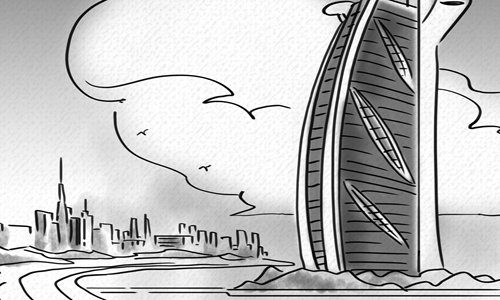 Illustration: Liu Rui/GT
Illustration: Liu Rui/GT
Economics observers always doubt the development of Dubai. They would keep asking questions about sustainability, even though the most open and prospering city in the Middle East, which has used energy to continue developing, has showcased strong momentum for development.
I have talked with a local friend about this argument during my recent visit to the city. He said Dubai had, indeed, experienced a slide after the 2008 financial crisis. It is still slowly recovering from that impact.
However, the United Arab Emirates (UAE) didn’t change its policies and has kept opening up. This will help the country that is dependent on petroleum maintain its charm to international capitals and talent.
Different from several years ago, most tourists at some of Dubai’s shopping malls and attractions are from China.
Descriptions of Dubai like “Paradise for shopping” and “The world’s most luxury metropolis” frequently appear in online articles in China.
Many Chinese people will be shocked by the openness of Dubai during their very first visit, getting an impression that is totally different from what they imagined.
Another impression many Chinese people could have is that Dubai has developed on the basis of black gold – petroleum – without which the city will not exist anymore, let alone have sustainable development.
However, my local friend who also engages in the real estate business, told me Dubai’s economic recovery was accompanied by structural transformation. In addition to emerging industries, such as real estate, the 22 free trade areas have attracted a great amount of foreign investment in finance, information technology and hotels.
Dubai also is making itself a capital of entertainment. The World Expo 2020 is a chance for the city to promote its tourist industry. Dubai’s goal is to attract more than 20 million visitors from all over the world in 2020.
Dubai’s resources for development are very limited. How should a city in the desert generate popularity and capital? Its location in the Middle East offers it a golden opportunity to pursue an economic policy of openness. Dubai knows clearly it has to rely on openness. At the end of 2018, the UAE enacted several laws to attract foreign investment.
Except for 14 industries such as oil production and exploration, military, banking and finance, the UAE permits full foreign ownership in the free trade zones. Previously, foreign firms needed a local partner with a majority share. Furthermore, the UAE grants investors and professionals a 10-year residency visa. In 2018, as the top destination for foreign direct investment (FDI) in the Middle East and Africa, it received $15 billion, or 22 percent of total FDI inflows in the region. With the implementation of the new policy, the UAE will upgrade its attraction of foreign investment and talent.
Even if Dubai’s openness only considers how to strengthen its position as a metropolis in the region, or a hub connecting Asia and Europe, its effects would not only be restricted to them.
Data from the Financial Times’ fDi intelligence shows that among the top 25 cities for artificial intelligence and robotics investment, Dubai was ranked No. 3 behind Singapore and Shanghai.
Today, the competition for global capital and talent is stepping up, openness has become an essential condition to win. The more open they are, the more likely they are to achieve success.
The author is a senior editor at People’s Daily, and a senior fellow at the Chongyang Institute for Financial Studies of Renmin University of China. dinggang@globaltimes.com.cn. Follow him on Twitter @dinggangchina

